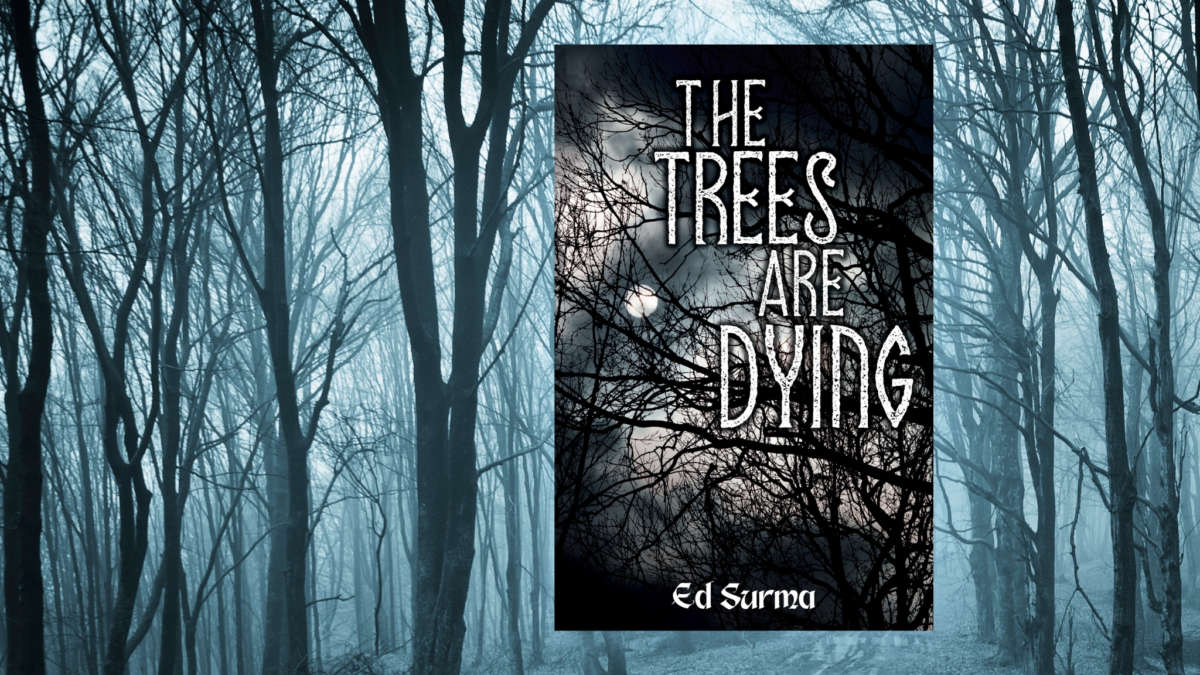In his lyrical, metaphysical novel, The Trees Are Dying, author Ed Surma uses storytelling to challenge readers to make a difference in our world. The frame of the story feels like a fairy tale — but this one is written for grownups.
The Twelve are faeries of the forest, each differentiated by their gender and a different color of the rainbow. They represent Righteousness and Truth. As they walk through the woods, sadness emanates from the withered trees around them.
“Like a tide rising up to drown them, the realization came to each exactly, precisely. ‘The trees are dying.’ Every tree, deciduous or coniferous, sapling or mighty patriarch, radiated the same dense sorrow.”
The Twelve try to commune with nature, but their meditation only serves to heighten their fear; the dying trees herald a dying Earth. They know they must seek advice from The Oracle — the mighty entity who can guide them in their quest to understand what’s happening. But what The Oracle professes scares them even more.
“We must have breakdown before we have breakthrough.”
The words of The Oracle “echo through their minds like a boulder tumbling down the wall of a canyon.”
How can such a mighty being allow the Earth to die? They beg for the knowledge they need to stop it from happening. The Oracle tells them to “Look within. Open to possibility,” and makes them understand that within their exquisite righteousness is pride. The Twelve realize they are part of the problem and vow to combine their efforts to resolve their burden. But most disturbing is the knowledge that they need cooperation from humans to succeed.
SPIRITUAL INTERVENTION
One day, a Goddess appears to a mortal man whose life is focused on comfort, wealth, entertainment and sex. As he jogs in the park, the beautiful being is always just out of reach. Her beauty is alluring, her brilliant green eyes “absorb him like a hummingbird sipping nectar.” He follows her until they are deep in the woods, surrounded by decay.
The Goddess challenges the man to search within himself. An abandoned building beckons him inside, where he views both his demise and his purpose on Earth — but seeing himself in death makes him feel all the more alive.
The Goddess knows he is not perfect and, like the forest, filled with decay. Yet his internal decadence allows him to know he is no better than anyone or anything else. He has compassion, and his actions will stem from that compassion.
“You are of power. Stand in your power and meet what confronts you. From that serenity arises. The slightest act of kindness might change the world,” she tells him.
QUEST AND CONFRONTATION
The man then connects with other mortals who join him in his mission: a spiritual woman who’s been searching for love and a lesbian accountant who yearns for more than preparing tax returns. As the group unites on a spiritual level, others who want to change the world for the better join them. Their circle of friends has blossomed — twelve people who live scattered throughout the city who had never known one another before that winter. They now connect “like a multidimensional spider’s web, more intimate than lovers.”
The circle increases to twelve groups of twelve, their power lying in their combined energy. They must confront The Oracle with their strength of commitment and connection. As their capacity for good overpowers The Oracle’s prediction of destruction, they realize that each has the power for change, and as the Goddess told them, the smallest act of kindness can change the world.
Surma’s characters represent both our spiritual and mortal selves, and the many varied faces of humanity. This dreamy mystical adult fable asks, “What can each of us do to save the Earth?” The answer lies in knowing that we each possess an inner power that can indeed change our world — one small act of kindness at a time.
https://booktrib.com/wp-content/uploads/2021/04/Edmund-Surma-profile-pix.jpg
About Edmund Surma:




